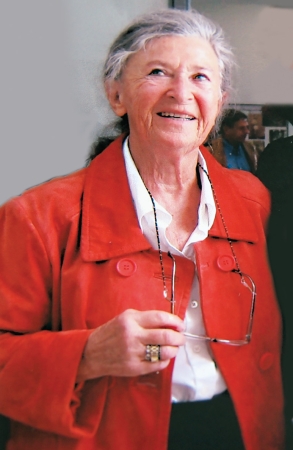
From Kolín to Jerusalem
Another story, this time from the Terezín ghetto, with the memoirs of Mrs Hana Lustigová – Greenfield. She was born on November 3rd 1926 in Kolín and grew up with her elder sister Irena in a patriotic Czech family. She doesn’t like talking about her childhood and we won’t go into it much more, not even in her book entitled “From Kolín to Jerusalem”.
With the coming of the German occupation and the anti-Jewish measures she was frightened, as was the whole family, but in this situation there were no thoughts of emigration. A great deal changed, and then eventually there came Terezín. She arrived in the ghetto with her extended family on the Kolín transport AAd on June 13th 1942. Being put to work in the kitchens helped her survive the pitiful conditions in the camp, though there were situations which made her stay in the ghetto almost unbearable. Her grandfather took his own life there, her beloved friend died after an operation, and her mother disappeared without a trace. Hana was separated from her completely unexpectedly in August 1943, when a transport of children from Bialystok arrived in Terezín. Marie Lustigová, a nurse, was one of 53 prisoners assigned to look after these children. They lived with them in the new western barracks behind the ghetto and were not allowed contact with anyone, to prevent them from spreading information from the children about the conditions in the Polish ghettos and camps. Despite this, Hana tried to at least get a glimpse of her mum. Her patience paid off and once she had the chance to call to her from her hiding place and speak to her. It was October 5th 1943 when the transport of twelve hundred Bialystok children and the Terezín nurses left – allegedly to Switzerland. After the war, however, it became apparent that the transport had ended up in Auschwitz – in the gas chambers. Yet after many years spent searching after the war, in an archive Hana discovered a document with the names of all those taken away on the special transport Dn/a. This was harsh confi rmation of her mother’s fate. The year was 1944 and in Terezín preparations for receiving a delegation from the International Committee of the Red Cross were reaching a peak. Seven and a half thousand prisoners had to leave the overcrowded ghetto, including Hana. In May she was taken by transport Eb to a family camp in Auschwitz – Birkenau. At the beginning of July 1944 all of those present underwent the selection process, which for Hana meant leaving to work in Germany. Her work group ended up in Freihafen near Hamburg. For the entire winter, until 1945, the prisoners cleared up the debris from the allied bombing all over that area. Hana remembers one time from then when she was helped by unknown people. When the SS surveillance eased off , she managed to run out of the ruined street to a little house, where she knocked and begged for a little food. She was given soup and told to come again. The second time, besides food, the family also gave her some big boots with new solid soles, a valuable gift at the time. From then on she did not suff er so much in the winter. Hana still remembers those people today. The bombing of German towns persisted, the end of the war was approaching, and the rest of Hana’s work group was transferred to the camp in Bergen – Belsen. The horrors of that place and eventually the joy of liberation are things that cannot be forgotten. The thirst, infected water, hunger, piles of dead bodies, then the sight of the fi rst British tank – April 15th 1945. After the war she did not stay long in her hometown of Kolín; after a time Hana moved to Israel, where she still lives with her family today. In her new home she decided to study, and then to spread information about the times of the holocaust. She has set up an educational programme and has trained not only young people, but also survivors of the concentration camps, to make appearances like she does and to talk about their experiences, and to lead meetings.
Recorded in May 2013
Nesouhlas se zpracováním Vašich osobních údajů byl zaznamenán.
Váš záznam bude z databáze Vydavatelstvím KAM po Česku s.r.o. vymazán neprodleně, nejpozději však v zákonné lhůtě.